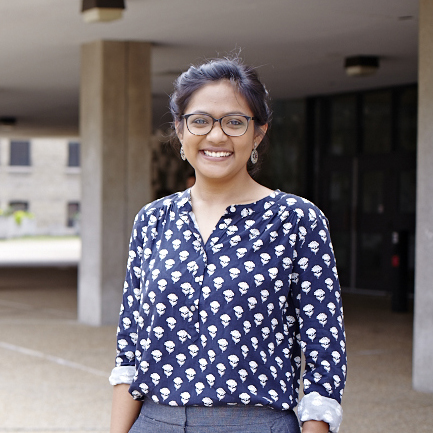Senjuti Saha

Senjuti Saha
Alumna, PhD (2017), Molecular Genetics
“I'm embarking on a career that bridges the gap between molecular biology and its implementation in resource-poor countries.”
My research focuses on developing novel therapeutics against the bacteria Pseudomonas aeruginosa, which causes multidrug-resistant infections. The infections are often fatal in immunocompromised patients, including burn victims, cancer and AIDS patients, and particularly in cystic fibrosis (CF) patients, of whom more than 80% are affected by chronic P. aeruginosa respiratory tract infections. I study a class of molecules called F-type pyocins, produced by P. aeruginosa to kill and outcompete other bacteria. I found several F-type pyocins that kill different strains of bacteria. I have engineered these particles to kill new strains of harmful bacteria that were previously resistant to drugs, and I’ve developed a safe and cost-effective method to produce these particles.
During graduate school, I was diagnosed with thyroid cancer; I needed surgery and I still rely on several pills every day. However, the University of Toronto’s health system made the whole process of coping with health issues relatively easy. Without the support of the University of Toronto, I would not have been able to continue my studies here.
Although I’m completing my doctorate in Molecular Genetics, I’m embarking on a career that bridges the gap between molecular biology and its implementation in resource-poor countries, advancing the cause of health equity. In collaboration with The Child Health Research Foundation of Bangladesh, I am beginning my work to determine the infectious agents that cause meningitis in children under five in Bangladesh. This study will have a significant impact on policy decisions for the treatment and prevention of meningitis in Bangladesh and the region.
I attended four international conferences during my graduate life. Each and every conference was a unique experience. I met renowned scientists from all over the world and engaged with in scientific discussions. I got the opportunity to present my own work and receive constructive feedback. The conferences also gave me the opportunity to travel to different cities and realize the scope of work in the field.
My advice for prospective students is that finding a lab with members whom you get along with is as important as finding a project and a supervisor whom you like. During graduate study, specifically in biology, one has to spend a significant amount of time collaborating closely with other lab members. My lab members are my family in Canada. I left home, family, language, and culture at the age of 18, but my lab members always ensured that I felt at home here. Collaboration with my colleagues has helped me become the scientist I am today.